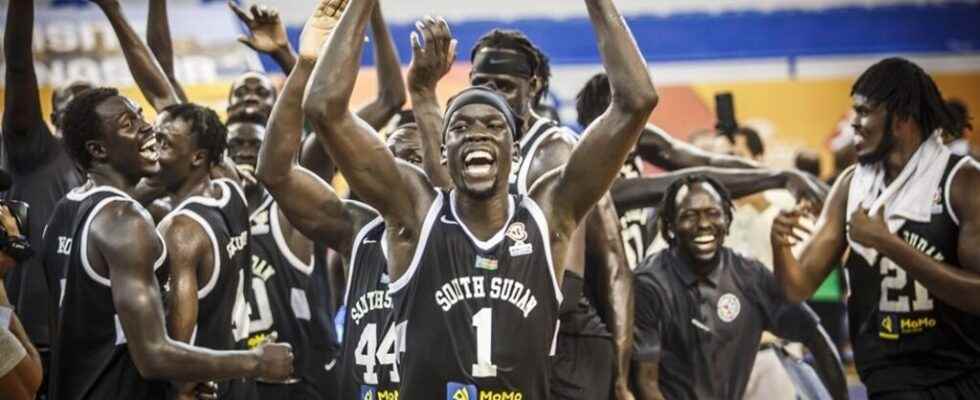South Sudan qualified for the 2023 Basketball World Cup for the first time in its history after winning against Senegal (83-75) this Friday, February 24 in the playoffs. It is a monumental performance for this young nation, born in 2011 and which played its first Afrobasket only in 2021.
“Incredible”, “Amazing”, “Historical”, etc., in the radius of superlatives, the stock may be exhausted to qualify the gigantic feat of the South Sudan basketball team, qualified for the first time in its history at the World Cup. The feat was already within reach on the eve of the fifth and final window of the qualifiers, as the Bright Stars, leaders of Group F, needed only a victory in three matches to validate their ticket. They shook a little, but ended up stepping on the Senegalese in the last quarter (24-12) clinching qualification before facing DR Congo on Saturday, and Egypt on Sunday.
This feat is obviously enormous for a country whose national team played its first official basketball match on July 10, 2011, against Uganda (69-73), the day after gaining independence.
Despite the permanent territorial disputes, the civil war from 2013 to 2020, the poverty of the country, ranked last in the world in terms of the Human Development Index (HDI) by the United Nations Development Program (UNDP), basketball knew how to trace a path of glory.
From refugees to national heroes
After a historic qualification for the first time at Afrobasket 2021 and an elimination in the quarter-finals by eventual winners Tunisia, the South Sudanese have not stopped progressing.
The recipe is primarily due to the contribution of the players, whose parents fled the war. They were born or raised far from their country of origin and trained mainly in Australia and the United States. Winger Nuni Omot, born in a refugee camp in Kenya, grew up on American courts, just like Mayan Keer Kiir who arrived in the United States at the age of 4. Captain Kuany Ngor Kuany and other backbone members of the team, Deng Acuoth (pivot), Bul Kuol (back) and the very promising point guard Anyiarbany Makoi, born in Egypt, all grew up in Australia…
This gang of melting-pot players is skilfully managed by former NBA player Luol Deng, who was first coach and then president of the Federation. ” Luol Deng’s leadership as President of the South Sudan Basketball Federation is one of the main reasons for our rapid progress. His commitment, on and off the field, is exemplary “says Captain Kuany Ngor Kuany on the Fiba website.
“A nation that has a lot to offer the world”
Like his proteges, the former Los Angeles Lakers and Chicago Bulls player saw his parents flee the war in Sudan. Raised in Egypt, he met Sudanese NBA star Manute Bol there, who transmitted the basketball bug to him during a meeting with refugees. ” Manute stood for good things. He was famous, he played basketball […] and served others. I got into basketball because Manute took a vacation to help the South Sudanese community there.confessed Deng on olympics.com. So if it wasn’t for someone trying to help others from their home country, I would never have had the opportunity that I had. »
That’s how two-time All-star Luol Deng took charge of the destinies of South Sudanese basketball and applied his life lessons on the court to lead his country to the greatest sporting achievement in its history. “We work as hard as we can and push ourselves,” he says. Even on the days when you’re at your lowest, your teammates and coaches are there to support you and get you going again. I learned from my family in the locker room and vice versa. »
On the eve of this fifth qualifying window, captain Kuany Ngor Kuany confided: “ Qualifying for our first-ever FIBA Basketball World Cup would be a dream come true and it would mean a lot to our country. We are a young nation with a lot to offer the world and getting our ticket would do incredible publicity for South Sudan and bring immense joy to our compatriots. “.
Mission well accomplished…
The Basketball World Cup will take place from August 25 to September 10, 2023 in three countries: Japan, Philippines and Indonesia.
